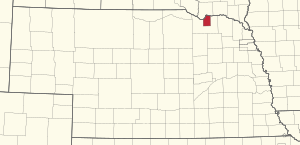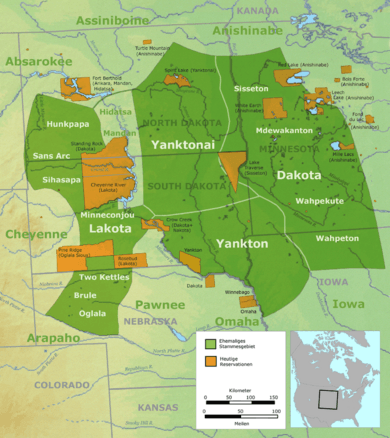Santee Sioux Reservation facts for kids
Quick facts for kids
Santee Sioux Reservation
Isáŋyathi (Dakota)
|
||
|---|---|---|
|
||

Location in Nebraska
|
||
| Tribe | Santee Sioux Nation | |
| Country | United States | |
| State | Nebraska | |
| County | Knox | |
| Headquarters | Niobrara | |
| Government | ||
| • Body | Tribal Council | |
| Area | ||
| • Total | 172.99 sq mi (448.0 km2) | |
| Population
(2017)
|
||
| • Total | 1,041 | |
| • Density | 6.0177/sq mi (2.3234/km2) | |
| Website | santeesiouxnation.net | |
The Santee Sioux Reservation (called Isáŋyathi in the Dakota language) is home to the Santee Sioux people. They are also known as the Eastern Dakota. This special area was set up in 1863 in what is now Nebraska. The main office for the tribal government is in Niobrara, Nebraska. The reservation lands are located in Knox County.
History of the Santee Sioux Reservation
The Santee Sioux Reservation was created by the U.S. Congress on March 3, 1863. It was officially recognized later through special government orders and agreements called treaties. These agreements helped set the boundaries and rules for the reservation.
In the early years, families on the reservation chose areas for their homes, called homesteads. Other parts of the land were set aside for families to use, known as allotments. Some land was also used for an Indian agency, which was like a government office, a school, and a mission.
Geography and Population
The reservation is located along the southern bank of the Missouri River. It even includes a part of Lewis and Clark Lake. In 2000, about 878 people lived on the reservation. Most of them (64.1%) were Native American, and 33.7% were White. The reservation covers about 173 square miles (448 square kilometers).
The biggest town on the reservation is Santee, which is in the northern part. Other large groups of Oglala Lakota and Brulé Sioux people live on reservations north of here, in South Dakota.
Communities on the Reservation
The Santee Sioux Reservation includes a few towns where people live. These communities are important centers for the tribal members.
 | Lonnie Johnson |
 | Granville Woods |
 | Lewis Howard Latimer |
 | James West |



